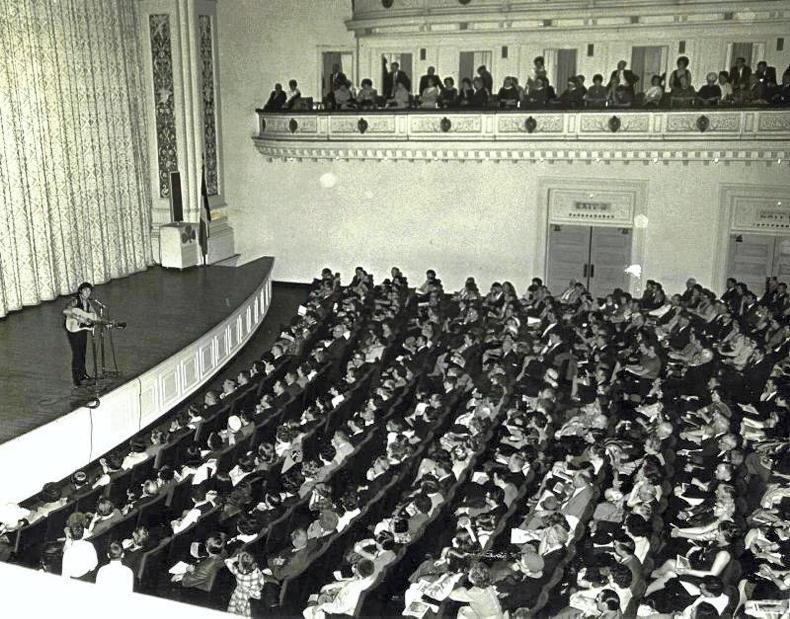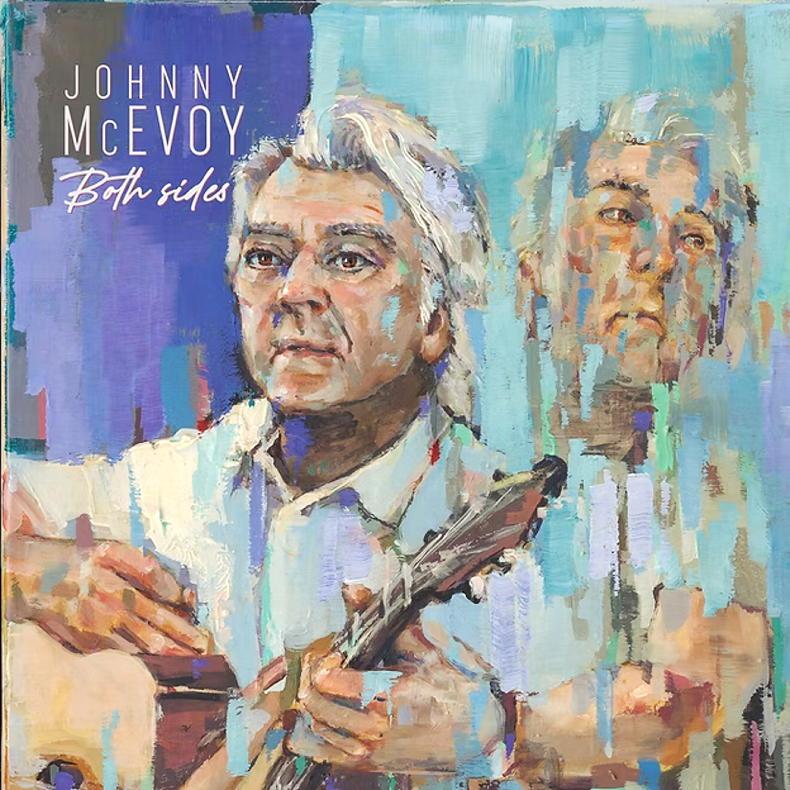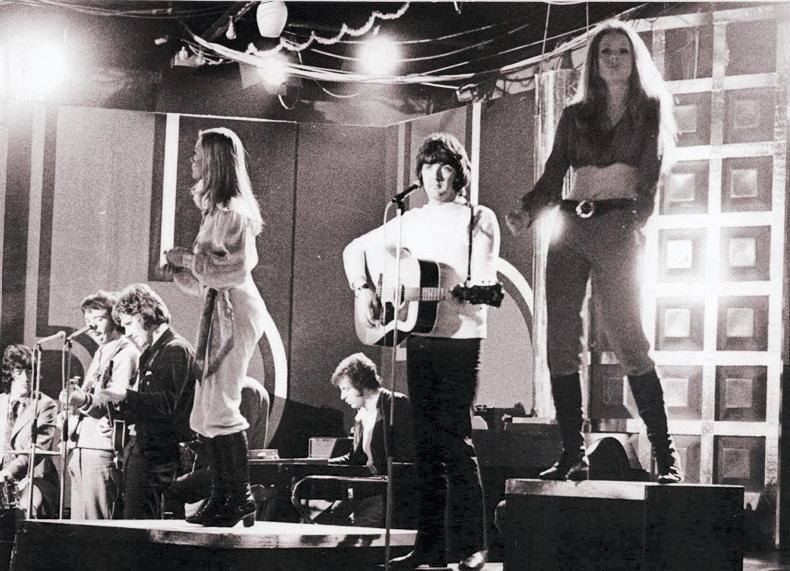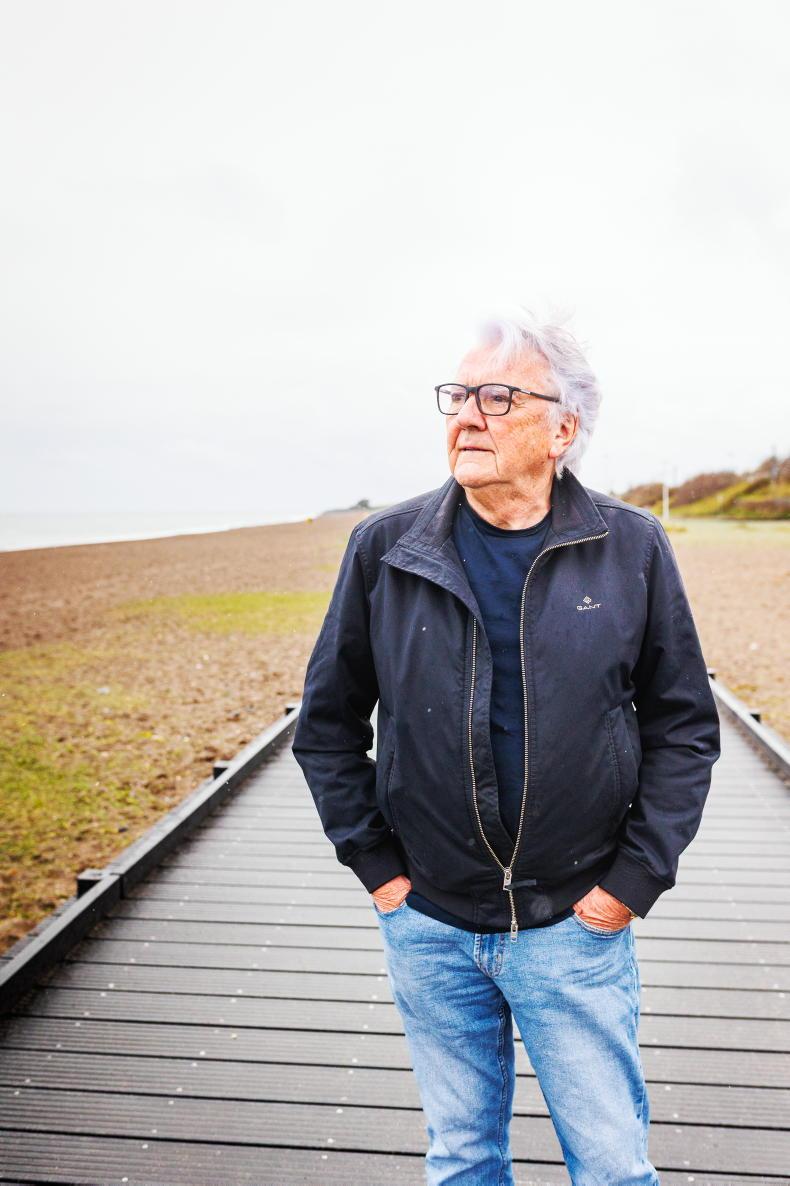Legendary musician and songwriter Johnny McEvoy has enjoyed a career that spans six decades – a most unusual feat in the industry these days. The key to his continued popularity with an Irish audience? “Staying alive!” he jokes.
Johnny, who was born in Co Offaly and now lives by the sea in Greystones, Co Wicklow. The day this paper is published is a momentous one for Johnny, as he celebrates his 80th birthday.
Returning to the question in a more serious fashion, Johnny reflects: “I learnt a lot from my father, without him even knowing it. Always be on time no matter who you’re with. I never missed a day at school, I was never even late for school,” he continues.
“I’ve stayed the same all my life. I believe that is why I lasted so long. I could count on one hand the number of gigs I’ve missed due to illness. I just took it very seriously.”
Johnny describes himself as obsessed with singing from a very young age. “My mother told me I was singing since the age of four. Singing on the bicycle going to school, singing at bed at night. When it came to going asleep, I used to sing the national anthem.”
It seems like the work ethic Johnny learned from his father distills down to ‘getting the basics right’ and it is an attitude that he and his bandmate Michael Crotty harnessed in their duo, The Ramblers Two. “We were just professional. Never late going on stage and always dressed properly. Michael was a good harmoniser and a good guitar player.”
Never had a job since
Johnny met Michael at art school in Rathmines, Dublin when he was working as a commercial artist in an advertising agency.
“That’s what I wanted to do. Then when I was signing up for night classes, I met this young man from Waterford in the queue and we hit it off and we realised, gosh, we like the same music.”
After his big break with Muirsheen Durkin in 1966, there came a point when Johnny had to choose between advertising and music. The decision, he says, was simple: “I’ve never had a job since.”
Decades on, Michael and Johnny continue to meet up every two weeks, “and all we talk about are those days”, smiles Johnny.

Johnny performing in Carnagie Hall, New York in 1968.
“Those days” sound full-on and far removed from the work-life balance many now strive to protect. “I was on the road about six nights a week. That was for 12 years. It was tough but it was exciting. My wife was a great support, but she had to put up with a lot of that [late nights].”
Johnny was playing in dance halls around the country, many of which are now closed down.
“The dances were going six nights a week, you’d never get that now,” he recalls. “I recently drove from Stramore in Co Monaghan to Killarney and I counted six dance halls where I had played – they were all closed.”
Although readers may think of Johnny as a singer, that is not how he first identifies. “I’m a storyteller, that’s how I think about myself,” he explains. “When I write a song, I always do the lyrics first and then record the melody. I don’t get rid of anything I write because you never know when you’ll use something again. An idea for a song can hit you in the most unusual places.”
For Johnny, a song is a story, one which draws you in. “If you listen to White Christmas, it’s only got about three lines in it. It’s so simple but three lines can tell a whole story.”
Music is also a universal language, with an ability to tell stories in a way that transcends words, and a power, Johnny believes, to carry people through seasons of life.
“People play my songs in churches, at gravesides. They bring back memories.” Many say they are a source of comfort and nostalgia.
Johnny found another way to carry people through the COVID-19 pandemic, performing every Wednesday on Facebook, live with his guitar. An idea planned for two weeks continued for two years as a shared moment bringing people together in a lonely time.
It was at the end of lockdown in 2022 when Johnny recorded his new album, Both Sides.
“I started to write and then I went into the studio and recorded. I got to more than 20 songs and we used 14 of them, and six of my stories,” he says.

Johnny's new album, Both Sides (€20), tradnua.com.
Trail of Tears is Johnny’s favourite song on the album. It recalls the forced relocation of native American tribes in the 1830s from their ancestral lands to present-day Oklahoma.
“The ones that made it there had absolutely nothing. They were devastated, they’d lost everything,” says Johnny. “That line, the trail of tears, is very strong.”
Reflections on the past
Johnny’s music displays a sensitivity to history. His songs fuse historical narrative and contain reflections on the past. Another of his favourite songs is Michael (The Ballad of Michael Collins) which describes the revolutionary leader''s role in Irish independence, although now he finds it harder to sing.
“I’ve sang it too many times. It’s my last song every night."
Johnny also mentions the Ballad of Anne Frank: “I’m very proud of the lyrics, I don’t mention her name in it.”
The release of his album and nationwide tour just preceded Johnny’s 80th birthday, and he shows no signs of slowing down, remarking that his health is “very good”.
“Ageing has never bothered me. I was nearly grey at 30,” says Johnny. “The only thing about 80 is: you go to bed when you’re 19, you’ve had a great night out, you feel in great form, you’re going to save the world... you get up in the morning and you’re 80! It goes that fast.”
He also attributes music – the literal drumbeat of his life and career – with keeping him young. Johnny says that singing keeps him engaged with the world and is a source of creativity and expression.

Johnny performing in Cliff Castle in 1970.
“With music, you’re using your brain and when you are writing, you’re getting things out of your head. I’m walking along the beach making up songs and then I’d go to bed and wake up at 4am to write a line, then go back to sleep. It keeps you fresh.”
Johnny insists that he does not sing for an audience, that “it doesn’t matter if there’s two people or 2,000 people" at his concerts. He stresses that it is the “physical and mental act of singing” that brings him such enjoyment. “You feel a great power,” he says. “I couldn''t do without it."
He is also keen to relay that music does not feel like work. “I’ve never written one song with the intention of making money on it. If they don’t sell, fine. Luckily most of them have sold,” he says. “From the day I started singing up to now, I’ve never called it a job."
Legendary musician and songwriter Johnny McEvoy has enjoyed a career that spans six decades – a most unusual feat in the industry these days. The key to his continued popularity with an Irish audience? “Staying alive!” he jokes.
Johnny, who was born in Co Offaly and now lives by the sea in Greystones, Co Wicklow. The day this paper is published is a momentous one for Johnny, as he celebrates his 80th birthday.
Returning to the question in a more serious fashion, Johnny reflects: “I learnt a lot from my father, without him even knowing it. Always be on time no matter who you’re with. I never missed a day at school, I was never even late for school,” he continues.
“I’ve stayed the same all my life. I believe that is why I lasted so long. I could count on one hand the number of gigs I’ve missed due to illness. I just took it very seriously.”
Johnny describes himself as obsessed with singing from a very young age. “My mother told me I was singing since the age of four. Singing on the bicycle going to school, singing at bed at night. When it came to going asleep, I used to sing the national anthem.”
It seems like the work ethic Johnny learned from his father distills down to ‘getting the basics right’ and it is an attitude that he and his bandmate Michael Crotty harnessed in their duo, The Ramblers Two. “We were just professional. Never late going on stage and always dressed properly. Michael was a good harmoniser and a good guitar player.”
Never had a job since
Johnny met Michael at art school in Rathmines, Dublin when he was working as a commercial artist in an advertising agency.
“That’s what I wanted to do. Then when I was signing up for night classes, I met this young man from Waterford in the queue and we hit it off and we realised, gosh, we like the same music.”
After his big break with Muirsheen Durkin in 1966, there came a point when Johnny had to choose between advertising and music. The decision, he says, was simple: “I’ve never had a job since.”
Decades on, Michael and Johnny continue to meet up every two weeks, “and all we talk about are those days”, smiles Johnny.

Johnny performing in Carnagie Hall, New York in 1968.
“Those days” sound full-on and far removed from the work-life balance many now strive to protect. “I was on the road about six nights a week. That was for 12 years. It was tough but it was exciting. My wife was a great support, but she had to put up with a lot of that [late nights].”
Johnny was playing in dance halls around the country, many of which are now closed down.
“The dances were going six nights a week, you’d never get that now,” he recalls. “I recently drove from Stramore in Co Monaghan to Killarney and I counted six dance halls where I had played – they were all closed.”
Although readers may think of Johnny as a singer, that is not how he first identifies. “I’m a storyteller, that’s how I think about myself,” he explains. “When I write a song, I always do the lyrics first and then record the melody. I don’t get rid of anything I write because you never know when you’ll use something again. An idea for a song can hit you in the most unusual places.”
For Johnny, a song is a story, one which draws you in. “If you listen to White Christmas, it’s only got about three lines in it. It’s so simple but three lines can tell a whole story.”
Music is also a universal language, with an ability to tell stories in a way that transcends words, and a power, Johnny believes, to carry people through seasons of life.
“People play my songs in churches, at gravesides. They bring back memories.” Many say they are a source of comfort and nostalgia.
Johnny found another way to carry people through the COVID-19 pandemic, performing every Wednesday on Facebook, live with his guitar. An idea planned for two weeks continued for two years as a shared moment bringing people together in a lonely time.
It was at the end of lockdown in 2022 when Johnny recorded his new album, Both Sides.
“I started to write and then I went into the studio and recorded. I got to more than 20 songs and we used 14 of them, and six of my stories,” he says.

Johnny's new album, Both Sides (€20), tradnua.com.
Trail of Tears is Johnny’s favourite song on the album. It recalls the forced relocation of native American tribes in the 1830s from their ancestral lands to present-day Oklahoma.
“The ones that made it there had absolutely nothing. They were devastated, they’d lost everything,” says Johnny. “That line, the trail of tears, is very strong.”
Reflections on the past
Johnny’s music displays a sensitivity to history. His songs fuse historical narrative and contain reflections on the past. Another of his favourite songs is Michael (The Ballad of Michael Collins) which describes the revolutionary leader''s role in Irish independence, although now he finds it harder to sing.
“I’ve sang it too many times. It’s my last song every night."
Johnny also mentions the Ballad of Anne Frank: “I’m very proud of the lyrics, I don’t mention her name in it.”
The release of his album and nationwide tour just preceded Johnny’s 80th birthday, and he shows no signs of slowing down, remarking that his health is “very good”.
“Ageing has never bothered me. I was nearly grey at 30,” says Johnny. “The only thing about 80 is: you go to bed when you’re 19, you’ve had a great night out, you feel in great form, you’re going to save the world... you get up in the morning and you’re 80! It goes that fast.”
He also attributes music – the literal drumbeat of his life and career – with keeping him young. Johnny says that singing keeps him engaged with the world and is a source of creativity and expression.

Johnny performing in Cliff Castle in 1970.
“With music, you’re using your brain and when you are writing, you’re getting things out of your head. I’m walking along the beach making up songs and then I’d go to bed and wake up at 4am to write a line, then go back to sleep. It keeps you fresh.”
Johnny insists that he does not sing for an audience, that “it doesn’t matter if there’s two people or 2,000 people" at his concerts. He stresses that it is the “physical and mental act of singing” that brings him such enjoyment. “You feel a great power,” he says. “I couldn''t do without it."
He is also keen to relay that music does not feel like work. “I’ve never written one song with the intention of making money on it. If they don’t sell, fine. Luckily most of them have sold,” he says. “From the day I started singing up to now, I’ve never called it a job."













SHARING OPTIONS